Detailed Analysis of Canadian Income Tax Regime and Regulations
VerifiedAdded on 2022/09/08
|5
|1794
|16
Report
AI Summary
This report provides a detailed overview of the Canadian income tax regime. It begins by explaining the structure of the Canadian tax system, including the roles of the Canada Revenue Agency and the progressive tax rates. The report then delves into residency criteria, distinguishing between ordinary and deemed residents, and outlines the conditions that determine residency status. It covers filing requirements, taxable income sources (employment, investment, business, and dividends), and the treatment of capital gains. The report also discusses tax years, slab rates, deductions, allowances, and other taxes like real property tax and social security contributions. Furthermore, it highlights filing and payment procedures, penalties for non-compliance, and relevant judicial precedents. Finally, it provides a conclusion summarizing the key aspects of the Canadian tax regime, emphasizing its complexity and the importance of professional tax preparation. The report includes references to relevant sources like the Canadian Income Tax Act and various tax resources.
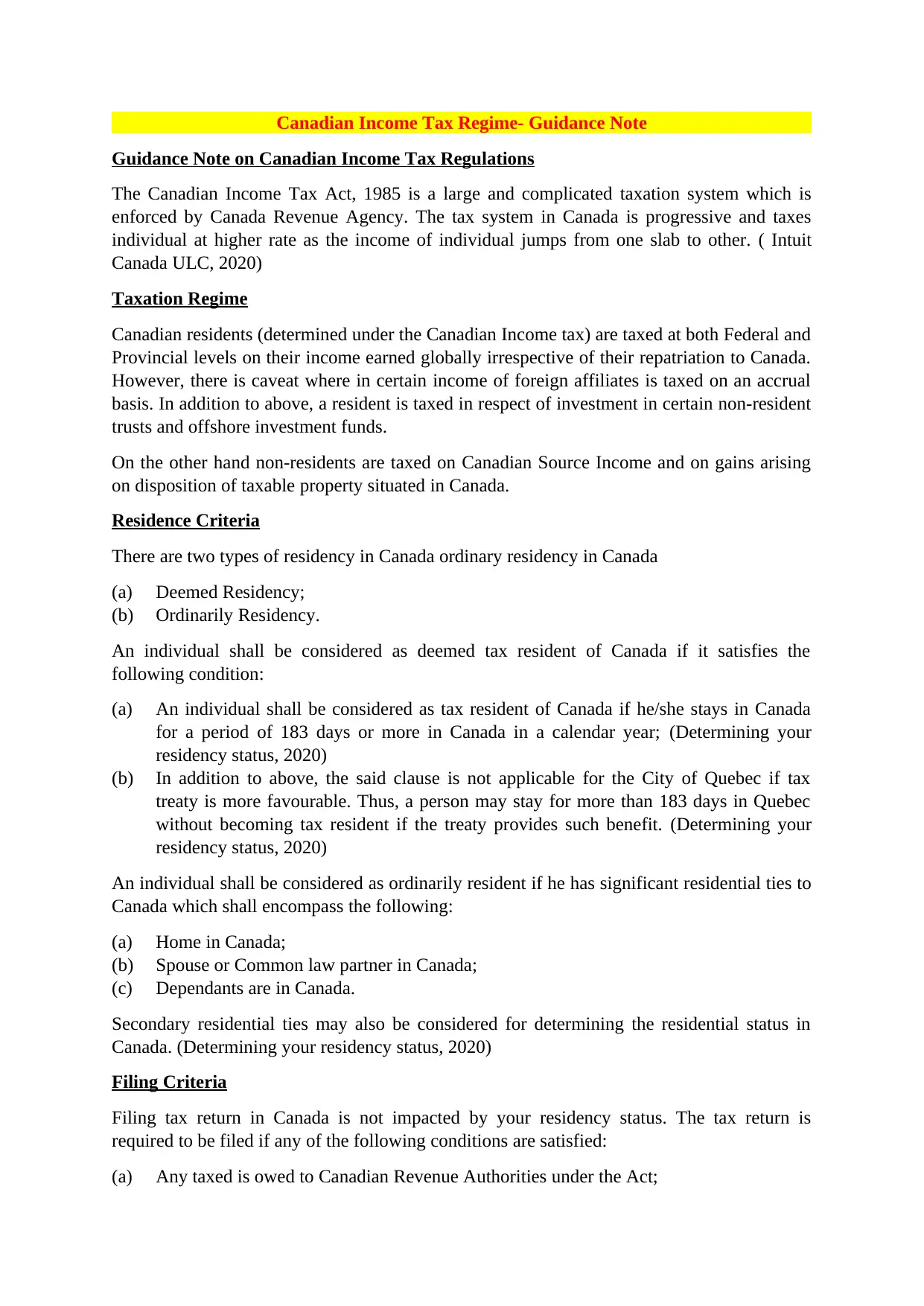
Canadian Income Tax Regime- Guidance Note
Guidance Note on Canadian Income Tax Regulations
The Canadian Income Tax Act, 1985 is a large and complicated taxation system which is
enforced by Canada Revenue Agency. The tax system in Canada is progressive and taxes
individual at higher rate as the income of individual jumps from one slab to other. ( Intuit
Canada ULC, 2020)
Taxation Regime
Canadian residents (determined under the Canadian Income tax) are taxed at both Federal and
Provincial levels on their income earned globally irrespective of their repatriation to Canada.
However, there is caveat where in certain income of foreign affiliates is taxed on an accrual
basis. In addition to above, a resident is taxed in respect of investment in certain non-resident
trusts and offshore investment funds.
On the other hand non-residents are taxed on Canadian Source Income and on gains arising
on disposition of taxable property situated in Canada.
Residence Criteria
There are two types of residency in Canada ordinary residency in Canada
(a) Deemed Residency;
(b) Ordinarily Residency.
An individual shall be considered as deemed tax resident of Canada if it satisfies the
following condition:
(a) An individual shall be considered as tax resident of Canada if he/she stays in Canada
for a period of 183 days or more in Canada in a calendar year; (Determining your
residency status, 2020)
(b) In addition to above, the said clause is not applicable for the City of Quebec if tax
treaty is more favourable. Thus, a person may stay for more than 183 days in Quebec
without becoming tax resident if the treaty provides such benefit. (Determining your
residency status, 2020)
An individual shall be considered as ordinarily resident if he has significant residential ties to
Canada which shall encompass the following:
(a) Home in Canada;
(b) Spouse or Common law partner in Canada;
(c) Dependants are in Canada.
Secondary residential ties may also be considered for determining the residential status in
Canada. (Determining your residency status, 2020)
Filing Criteria
Filing tax return in Canada is not impacted by your residency status. The tax return is
required to be filed if any of the following conditions are satisfied:
(a) Any taxed is owed to Canadian Revenue Authorities under the Act;
Guidance Note on Canadian Income Tax Regulations
The Canadian Income Tax Act, 1985 is a large and complicated taxation system which is
enforced by Canada Revenue Agency. The tax system in Canada is progressive and taxes
individual at higher rate as the income of individual jumps from one slab to other. ( Intuit
Canada ULC, 2020)
Taxation Regime
Canadian residents (determined under the Canadian Income tax) are taxed at both Federal and
Provincial levels on their income earned globally irrespective of their repatriation to Canada.
However, there is caveat where in certain income of foreign affiliates is taxed on an accrual
basis. In addition to above, a resident is taxed in respect of investment in certain non-resident
trusts and offshore investment funds.
On the other hand non-residents are taxed on Canadian Source Income and on gains arising
on disposition of taxable property situated in Canada.
Residence Criteria
There are two types of residency in Canada ordinary residency in Canada
(a) Deemed Residency;
(b) Ordinarily Residency.
An individual shall be considered as deemed tax resident of Canada if it satisfies the
following condition:
(a) An individual shall be considered as tax resident of Canada if he/she stays in Canada
for a period of 183 days or more in Canada in a calendar year; (Determining your
residency status, 2020)
(b) In addition to above, the said clause is not applicable for the City of Quebec if tax
treaty is more favourable. Thus, a person may stay for more than 183 days in Quebec
without becoming tax resident if the treaty provides such benefit. (Determining your
residency status, 2020)
An individual shall be considered as ordinarily resident if he has significant residential ties to
Canada which shall encompass the following:
(a) Home in Canada;
(b) Spouse or Common law partner in Canada;
(c) Dependants are in Canada.
Secondary residential ties may also be considered for determining the residential status in
Canada. (Determining your residency status, 2020)
Filing Criteria
Filing tax return in Canada is not impacted by your residency status. The tax return is
required to be filed if any of the following conditions are satisfied:
(a) Any taxed is owed to Canadian Revenue Authorities under the Act;
Paraphrase This Document
Need a fresh take? Get an instant paraphrase of this document with our AI Paraphraser
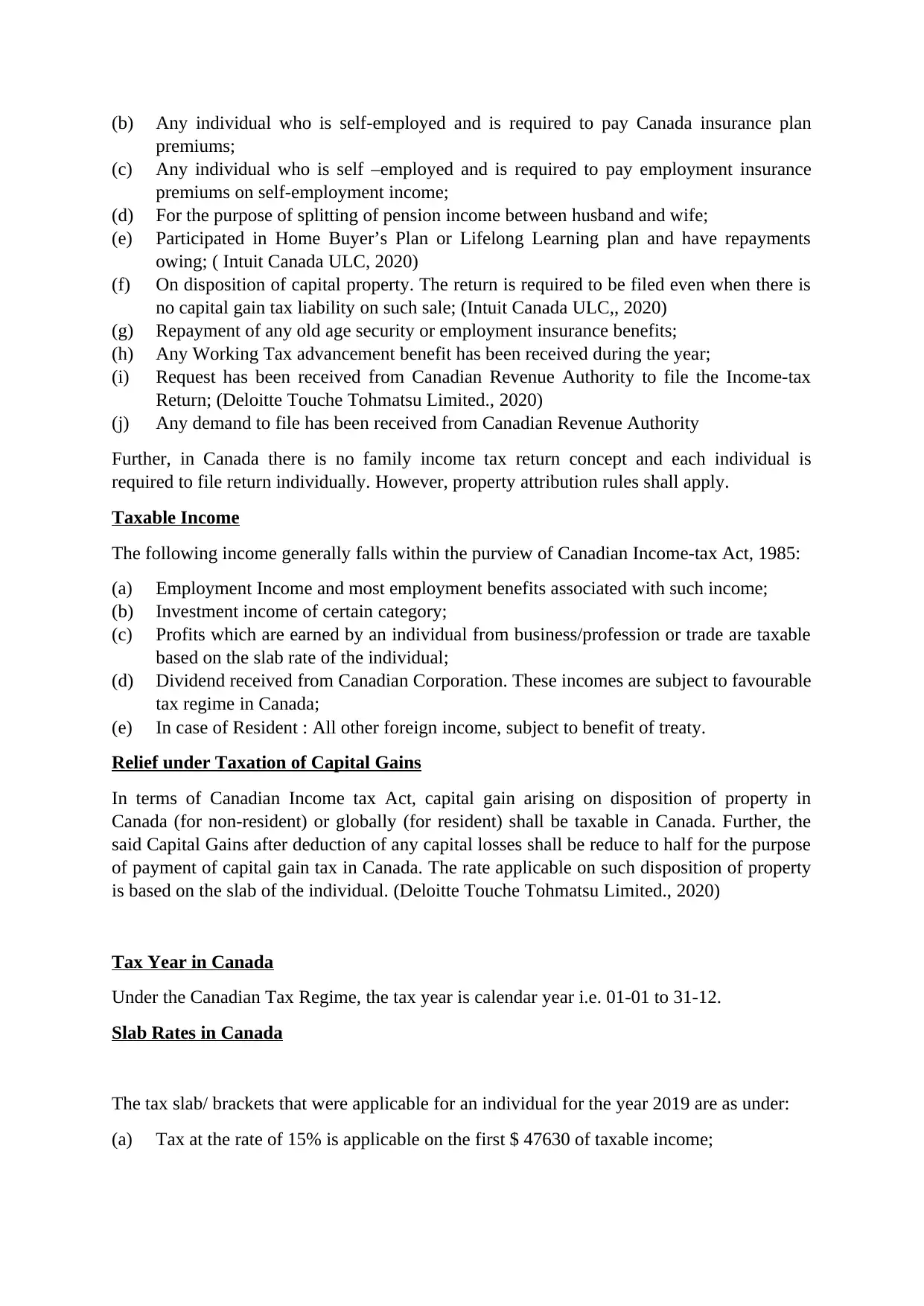
(b) Any individual who is self-employed and is required to pay Canada insurance plan
premiums;
(c) Any individual who is self –employed and is required to pay employment insurance
premiums on self-employment income;
(d) For the purpose of splitting of pension income between husband and wife;
(e) Participated in Home Buyer’s Plan or Lifelong Learning plan and have repayments
owing; ( Intuit Canada ULC, 2020)
(f) On disposition of capital property. The return is required to be filed even when there is
no capital gain tax liability on such sale; (Intuit Canada ULC,, 2020)
(g) Repayment of any old age security or employment insurance benefits;
(h) Any Working Tax advancement benefit has been received during the year;
(i) Request has been received from Canadian Revenue Authority to file the Income-tax
Return; (Deloitte Touche Tohmatsu Limited., 2020)
(j) Any demand to file has been received from Canadian Revenue Authority
Further, in Canada there is no family income tax return concept and each individual is
required to file return individually. However, property attribution rules shall apply.
Taxable Income
The following income generally falls within the purview of Canadian Income-tax Act, 1985:
(a) Employment Income and most employment benefits associated with such income;
(b) Investment income of certain category;
(c) Profits which are earned by an individual from business/profession or trade are taxable
based on the slab rate of the individual;
(d) Dividend received from Canadian Corporation. These incomes are subject to favourable
tax regime in Canada;
(e) In case of Resident : All other foreign income, subject to benefit of treaty.
Relief under Taxation of Capital Gains
In terms of Canadian Income tax Act, capital gain arising on disposition of property in
Canada (for non-resident) or globally (for resident) shall be taxable in Canada. Further, the
said Capital Gains after deduction of any capital losses shall be reduce to half for the purpose
of payment of capital gain tax in Canada. The rate applicable on such disposition of property
is based on the slab of the individual. (Deloitte Touche Tohmatsu Limited., 2020)
Tax Year in Canada
Under the Canadian Tax Regime, the tax year is calendar year i.e. 01-01 to 31-12.
Slab Rates in Canada
The tax slab/ brackets that were applicable for an individual for the year 2019 are as under:
(a) Tax at the rate of 15% is applicable on the first $ 47630 of taxable income;
premiums;
(c) Any individual who is self –employed and is required to pay employment insurance
premiums on self-employment income;
(d) For the purpose of splitting of pension income between husband and wife;
(e) Participated in Home Buyer’s Plan or Lifelong Learning plan and have repayments
owing; ( Intuit Canada ULC, 2020)
(f) On disposition of capital property. The return is required to be filed even when there is
no capital gain tax liability on such sale; (Intuit Canada ULC,, 2020)
(g) Repayment of any old age security or employment insurance benefits;
(h) Any Working Tax advancement benefit has been received during the year;
(i) Request has been received from Canadian Revenue Authority to file the Income-tax
Return; (Deloitte Touche Tohmatsu Limited., 2020)
(j) Any demand to file has been received from Canadian Revenue Authority
Further, in Canada there is no family income tax return concept and each individual is
required to file return individually. However, property attribution rules shall apply.
Taxable Income
The following income generally falls within the purview of Canadian Income-tax Act, 1985:
(a) Employment Income and most employment benefits associated with such income;
(b) Investment income of certain category;
(c) Profits which are earned by an individual from business/profession or trade are taxable
based on the slab rate of the individual;
(d) Dividend received from Canadian Corporation. These incomes are subject to favourable
tax regime in Canada;
(e) In case of Resident : All other foreign income, subject to benefit of treaty.
Relief under Taxation of Capital Gains
In terms of Canadian Income tax Act, capital gain arising on disposition of property in
Canada (for non-resident) or globally (for resident) shall be taxable in Canada. Further, the
said Capital Gains after deduction of any capital losses shall be reduce to half for the purpose
of payment of capital gain tax in Canada. The rate applicable on such disposition of property
is based on the slab of the individual. (Deloitte Touche Tohmatsu Limited., 2020)
Tax Year in Canada
Under the Canadian Tax Regime, the tax year is calendar year i.e. 01-01 to 31-12.
Slab Rates in Canada
The tax slab/ brackets that were applicable for an individual for the year 2019 are as under:
(a) Tax at the rate of 15% is applicable on the first $ 47630 of taxable income;
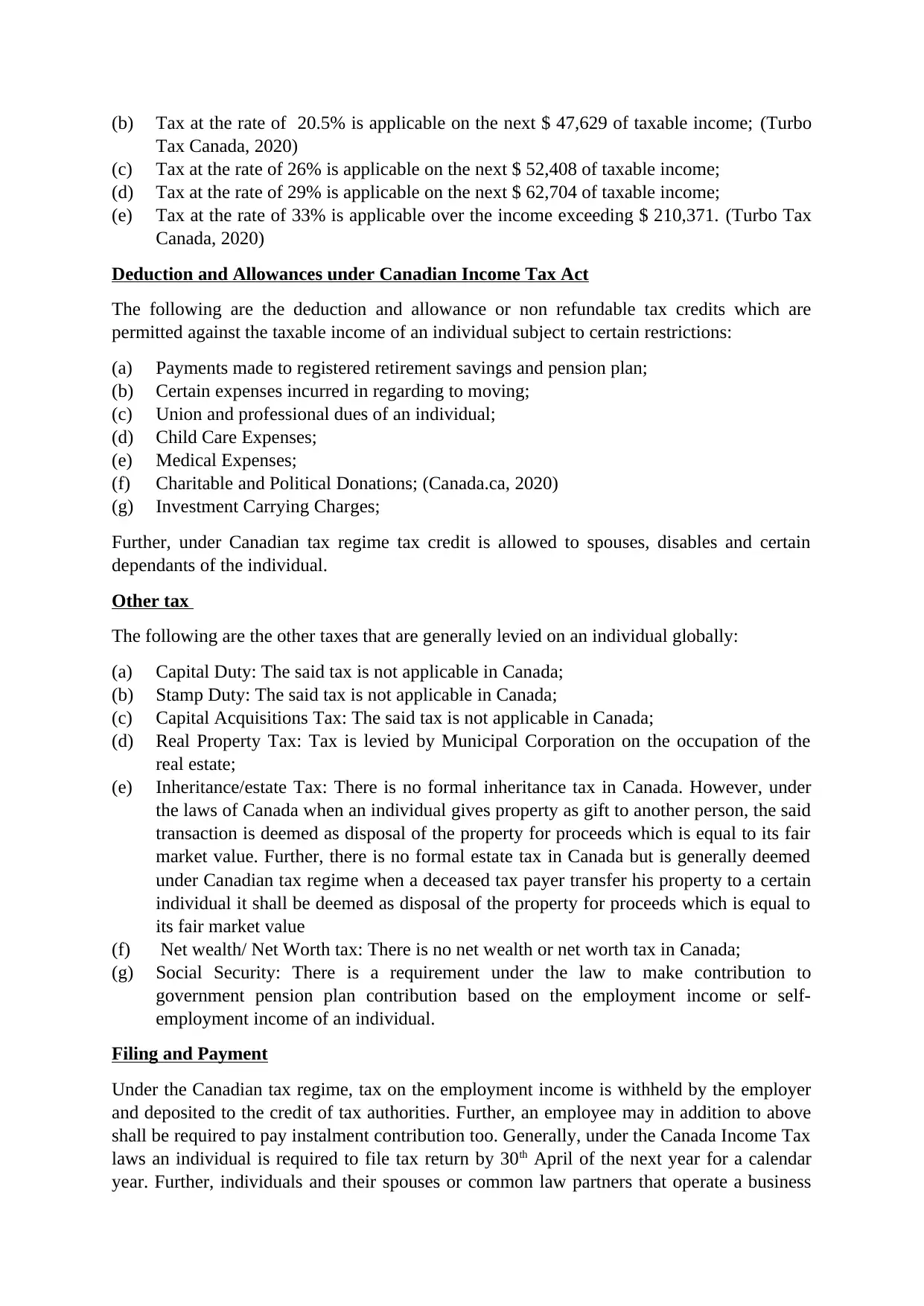
(b) Tax at the rate of 20.5% is applicable on the next $ 47,629 of taxable income; (Turbo
Tax Canada, 2020)
(c) Tax at the rate of 26% is applicable on the next $ 52,408 of taxable income;
(d) Tax at the rate of 29% is applicable on the next $ 62,704 of taxable income;
(e) Tax at the rate of 33% is applicable over the income exceeding $ 210,371. (Turbo Tax
Canada, 2020)
Deduction and Allowances under Canadian Income Tax Act
The following are the deduction and allowance or non refundable tax credits which are
permitted against the taxable income of an individual subject to certain restrictions:
(a) Payments made to registered retirement savings and pension plan;
(b) Certain expenses incurred in regarding to moving;
(c) Union and professional dues of an individual;
(d) Child Care Expenses;
(e) Medical Expenses;
(f) Charitable and Political Donations; (Canada.ca, 2020)
(g) Investment Carrying Charges;
Further, under Canadian tax regime tax credit is allowed to spouses, disables and certain
dependants of the individual.
Other tax
The following are the other taxes that are generally levied on an individual globally:
(a) Capital Duty: The said tax is not applicable in Canada;
(b) Stamp Duty: The said tax is not applicable in Canada;
(c) Capital Acquisitions Tax: The said tax is not applicable in Canada;
(d) Real Property Tax: Tax is levied by Municipal Corporation on the occupation of the
real estate;
(e) Inheritance/estate Tax: There is no formal inheritance tax in Canada. However, under
the laws of Canada when an individual gives property as gift to another person, the said
transaction is deemed as disposal of the property for proceeds which is equal to its fair
market value. Further, there is no formal estate tax in Canada but is generally deemed
under Canadian tax regime when a deceased tax payer transfer his property to a certain
individual it shall be deemed as disposal of the property for proceeds which is equal to
its fair market value
(f) Net wealth/ Net Worth tax: There is no net wealth or net worth tax in Canada;
(g) Social Security: There is a requirement under the law to make contribution to
government pension plan contribution based on the employment income or self-
employment income of an individual.
Filing and Payment
Under the Canadian tax regime, tax on the employment income is withheld by the employer
and deposited to the credit of tax authorities. Further, an employee may in addition to above
shall be required to pay instalment contribution too. Generally, under the Canada Income Tax
laws an individual is required to file tax return by 30th April of the next year for a calendar
year. Further, individuals and their spouses or common law partners that operate a business
Tax Canada, 2020)
(c) Tax at the rate of 26% is applicable on the next $ 52,408 of taxable income;
(d) Tax at the rate of 29% is applicable on the next $ 62,704 of taxable income;
(e) Tax at the rate of 33% is applicable over the income exceeding $ 210,371. (Turbo Tax
Canada, 2020)
Deduction and Allowances under Canadian Income Tax Act
The following are the deduction and allowance or non refundable tax credits which are
permitted against the taxable income of an individual subject to certain restrictions:
(a) Payments made to registered retirement savings and pension plan;
(b) Certain expenses incurred in regarding to moving;
(c) Union and professional dues of an individual;
(d) Child Care Expenses;
(e) Medical Expenses;
(f) Charitable and Political Donations; (Canada.ca, 2020)
(g) Investment Carrying Charges;
Further, under Canadian tax regime tax credit is allowed to spouses, disables and certain
dependants of the individual.
Other tax
The following are the other taxes that are generally levied on an individual globally:
(a) Capital Duty: The said tax is not applicable in Canada;
(b) Stamp Duty: The said tax is not applicable in Canada;
(c) Capital Acquisitions Tax: The said tax is not applicable in Canada;
(d) Real Property Tax: Tax is levied by Municipal Corporation on the occupation of the
real estate;
(e) Inheritance/estate Tax: There is no formal inheritance tax in Canada. However, under
the laws of Canada when an individual gives property as gift to another person, the said
transaction is deemed as disposal of the property for proceeds which is equal to its fair
market value. Further, there is no formal estate tax in Canada but is generally deemed
under Canadian tax regime when a deceased tax payer transfer his property to a certain
individual it shall be deemed as disposal of the property for proceeds which is equal to
its fair market value
(f) Net wealth/ Net Worth tax: There is no net wealth or net worth tax in Canada;
(g) Social Security: There is a requirement under the law to make contribution to
government pension plan contribution based on the employment income or self-
employment income of an individual.
Filing and Payment
Under the Canadian tax regime, tax on the employment income is withheld by the employer
and deposited to the credit of tax authorities. Further, an employee may in addition to above
shall be required to pay instalment contribution too. Generally, under the Canada Income Tax
laws an individual is required to file tax return by 30th April of the next year for a calendar
year. Further, individuals and their spouses or common law partners that operate a business
⊘ This is a preview!⊘
Do you want full access?
Subscribe today to unlock all pages.

Trusted by 1+ million students worldwide
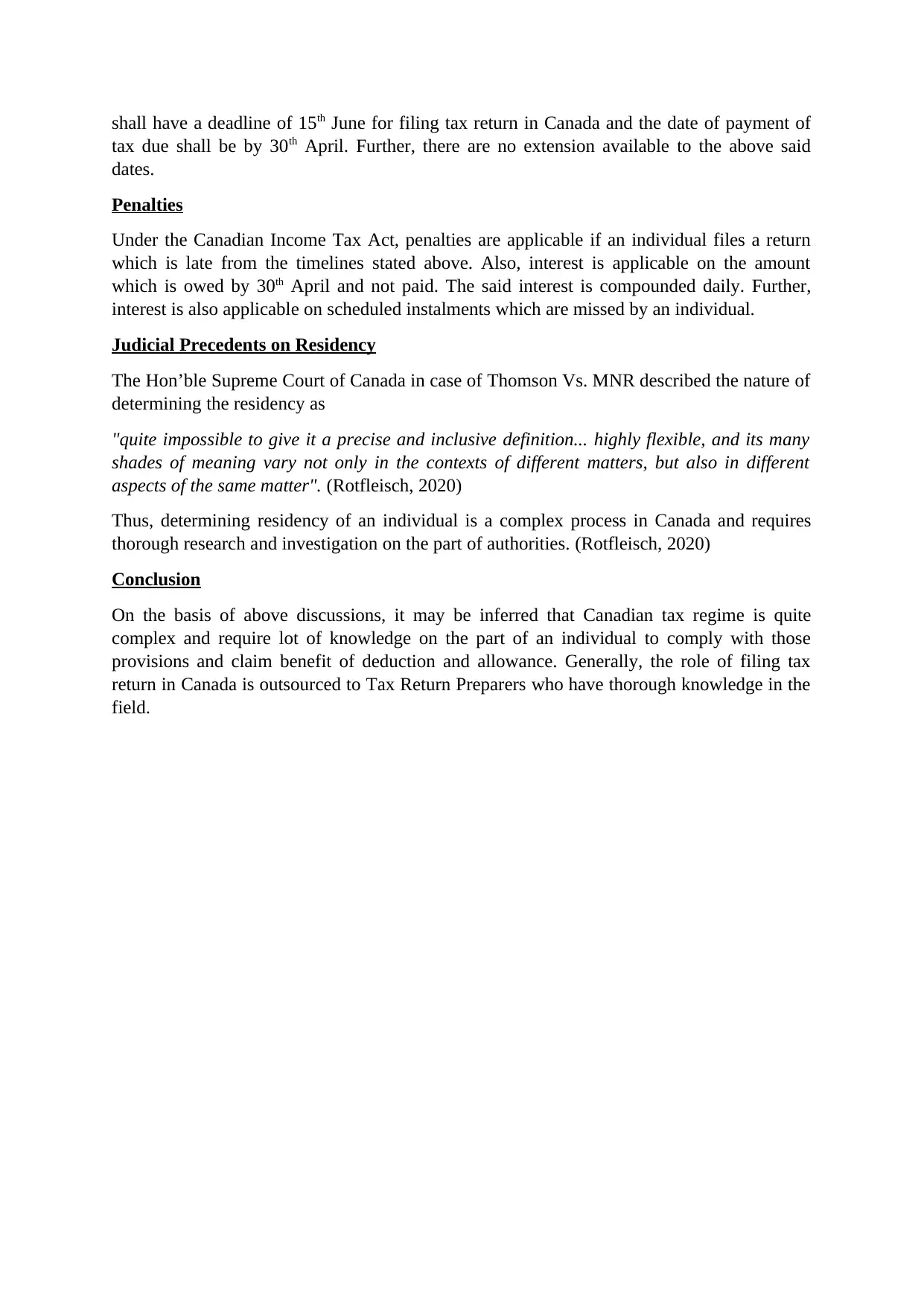
shall have a deadline of 15th June for filing tax return in Canada and the date of payment of
tax due shall be by 30th April. Further, there are no extension available to the above said
dates.
Penalties
Under the Canadian Income Tax Act, penalties are applicable if an individual files a return
which is late from the timelines stated above. Also, interest is applicable on the amount
which is owed by 30th April and not paid. The said interest is compounded daily. Further,
interest is also applicable on scheduled instalments which are missed by an individual.
Judicial Precedents on Residency
The Hon’ble Supreme Court of Canada in case of Thomson Vs. MNR described the nature of
determining the residency as
"quite impossible to give it a precise and inclusive definition... highly flexible, and its many
shades of meaning vary not only in the contexts of different matters, but also in different
aspects of the same matter". (Rotfleisch, 2020)
Thus, determining residency of an individual is a complex process in Canada and requires
thorough research and investigation on the part of authorities. (Rotfleisch, 2020)
Conclusion
On the basis of above discussions, it may be inferred that Canadian tax regime is quite
complex and require lot of knowledge on the part of an individual to comply with those
provisions and claim benefit of deduction and allowance. Generally, the role of filing tax
return in Canada is outsourced to Tax Return Preparers who have thorough knowledge in the
field.
tax due shall be by 30th April. Further, there are no extension available to the above said
dates.
Penalties
Under the Canadian Income Tax Act, penalties are applicable if an individual files a return
which is late from the timelines stated above. Also, interest is applicable on the amount
which is owed by 30th April and not paid. The said interest is compounded daily. Further,
interest is also applicable on scheduled instalments which are missed by an individual.
Judicial Precedents on Residency
The Hon’ble Supreme Court of Canada in case of Thomson Vs. MNR described the nature of
determining the residency as
"quite impossible to give it a precise and inclusive definition... highly flexible, and its many
shades of meaning vary not only in the contexts of different matters, but also in different
aspects of the same matter". (Rotfleisch, 2020)
Thus, determining residency of an individual is a complex process in Canada and requires
thorough research and investigation on the part of authorities. (Rotfleisch, 2020)
Conclusion
On the basis of above discussions, it may be inferred that Canadian tax regime is quite
complex and require lot of knowledge on the part of an individual to comply with those
provisions and claim benefit of deduction and allowance. Generally, the role of filing tax
return in Canada is outsourced to Tax Return Preparers who have thorough knowledge in the
field.
Paraphrase This Document
Need a fresh take? Get an instant paraphrase of this document with our AI Paraphraser
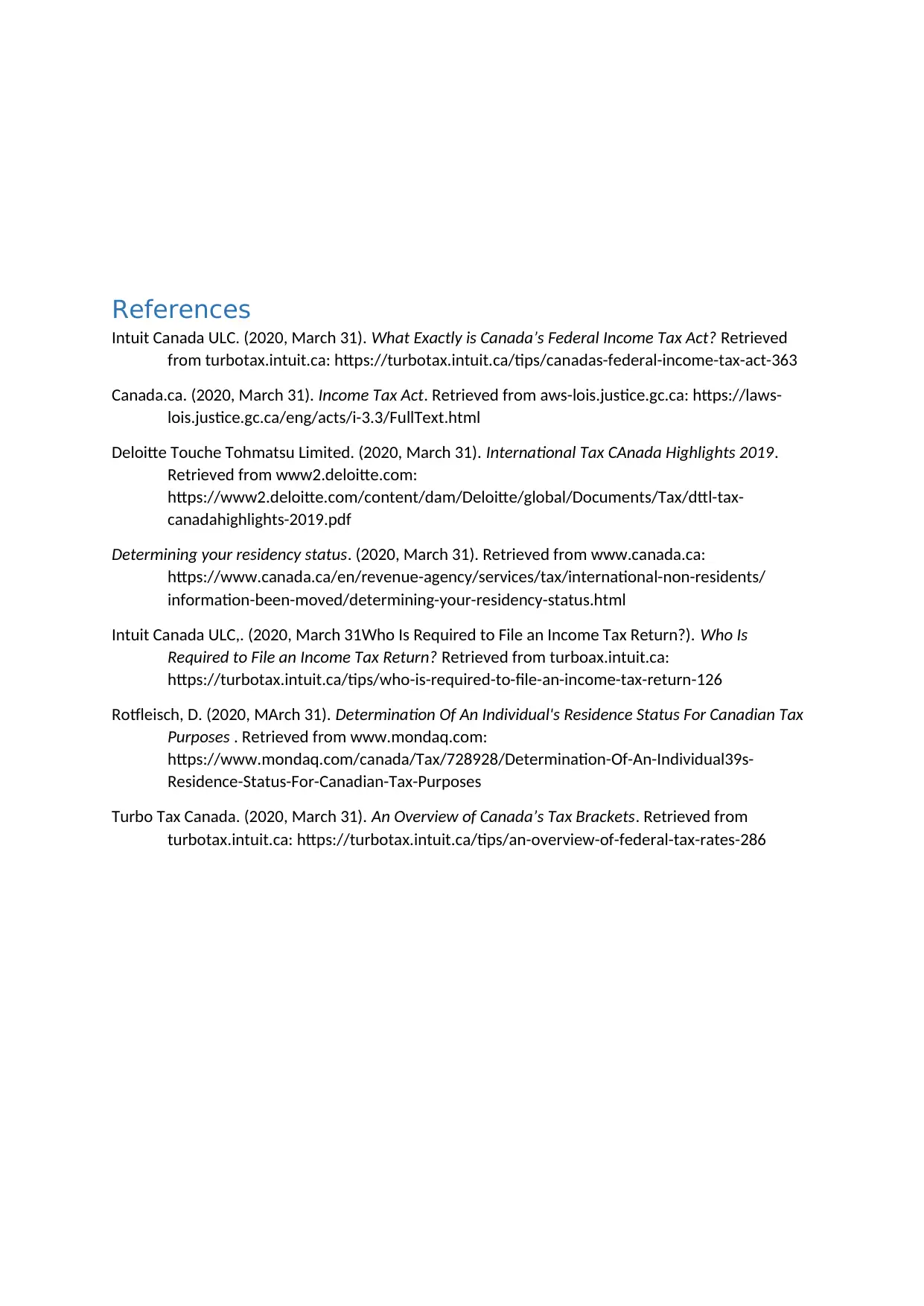
References
Intuit Canada ULC. (2020, March 31). What Exactly is Canada’s Federal Income Tax Act? Retrieved
from turbotax.intuit.ca: https://turbotax.intuit.ca/tips/canadas-federal-income-tax-act-363
Canada.ca. (2020, March 31). Income Tax Act. Retrieved from aws-lois.justice.gc.ca: https://laws-
lois.justice.gc.ca/eng/acts/i-3.3/FullText.html
Deloitte Touche Tohmatsu Limited. (2020, March 31). International Tax CAnada Highlights 2019.
Retrieved from www2.deloitte.com:
https://www2.deloitte.com/content/dam/Deloitte/global/Documents/Tax/dttl-tax-
canadahighlights-2019.pdf
Determining your residency status. (2020, March 31). Retrieved from www.canada.ca:
https://www.canada.ca/en/revenue-agency/services/tax/international-non-residents/
information-been-moved/determining-your-residency-status.html
Intuit Canada ULC,. (2020, March 31Who Is Required to File an Income Tax Return?). Who Is
Required to File an Income Tax Return? Retrieved from turboax.intuit.ca:
https://turbotax.intuit.ca/tips/who-is-required-to-file-an-income-tax-return-126
Rotfleisch, D. (2020, MArch 31). Determination Of An Individual's Residence Status For Canadian Tax
Purposes . Retrieved from www.mondaq.com:
https://www.mondaq.com/canada/Tax/728928/Determination-Of-An-Individual39s-
Residence-Status-For-Canadian-Tax-Purposes
Turbo Tax Canada. (2020, March 31). An Overview of Canada’s Tax Brackets. Retrieved from
turbotax.intuit.ca: https://turbotax.intuit.ca/tips/an-overview-of-federal-tax-rates-286
Intuit Canada ULC. (2020, March 31). What Exactly is Canada’s Federal Income Tax Act? Retrieved
from turbotax.intuit.ca: https://turbotax.intuit.ca/tips/canadas-federal-income-tax-act-363
Canada.ca. (2020, March 31). Income Tax Act. Retrieved from aws-lois.justice.gc.ca: https://laws-
lois.justice.gc.ca/eng/acts/i-3.3/FullText.html
Deloitte Touche Tohmatsu Limited. (2020, March 31). International Tax CAnada Highlights 2019.
Retrieved from www2.deloitte.com:
https://www2.deloitte.com/content/dam/Deloitte/global/Documents/Tax/dttl-tax-
canadahighlights-2019.pdf
Determining your residency status. (2020, March 31). Retrieved from www.canada.ca:
https://www.canada.ca/en/revenue-agency/services/tax/international-non-residents/
information-been-moved/determining-your-residency-status.html
Intuit Canada ULC,. (2020, March 31Who Is Required to File an Income Tax Return?). Who Is
Required to File an Income Tax Return? Retrieved from turboax.intuit.ca:
https://turbotax.intuit.ca/tips/who-is-required-to-file-an-income-tax-return-126
Rotfleisch, D. (2020, MArch 31). Determination Of An Individual's Residence Status For Canadian Tax
Purposes . Retrieved from www.mondaq.com:
https://www.mondaq.com/canada/Tax/728928/Determination-Of-An-Individual39s-
Residence-Status-For-Canadian-Tax-Purposes
Turbo Tax Canada. (2020, March 31). An Overview of Canada’s Tax Brackets. Retrieved from
turbotax.intuit.ca: https://turbotax.intuit.ca/tips/an-overview-of-federal-tax-rates-286
1 out of 5
Your All-in-One AI-Powered Toolkit for Academic Success.
+13062052269
info@desklib.com
Available 24*7 on WhatsApp / Email
![[object Object]](/_next/static/media/star-bottom.7253800d.svg)
Unlock your academic potential
Copyright © 2020–2026 A2Z Services. All Rights Reserved. Developed and managed by ZUCOL.
